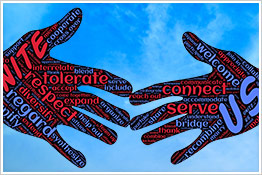What can you do for your country, your world—together?
By Marjorie Foerster Eddington
“Ask not what your country can do for you – ask what you can do for your country,” declared John F. Kennedy in his famous inaugural address in 1961. And in that same speech, he also challenged us to ask “what together we can do for the freedom of man.” So, let’s take up the call.
 One word that stands out to me in JFK’s challenge is together. What can we do together—what can we of all nationalities and races—do for the freedom of the citizens of the world? How do we get that togetherness? One word that stands out to me in JFK’s challenge is together. What can we do together—what can we of all nationalities and races—do for the freedom of the citizens of the world? How do we get that togetherness?
Here are some ideas to move us toward togetherness so we can work in unity to secure freedoms and make progress in peace. It starts at home—with our family, our friends, our country-mates; then it spreads out to the world.
We can:
- Look for similarities rather than highlight differences.
- Try to understand the other person’s point of view rather than push our own viewpoint.
- Ask questions when we don’t understand or don’t agree rather than make assumptions.
- Agree to disagree with tolerance rather than fight with criticism.
- Practice tolerance rather than foster contempt.
- Accept responsibility for our own actions, emotions, and our part in the issue or problem rather than blame others.
- Stop gossip dead in its tracks rather than spread rumors.
- Find out the truth of a situation rather than believe in lies or everything we hear, see, or read.
- Look for the motives or feelings behind why people do what they do or say rather than get stuck on surface appearances (what appears to be going on or what people are claiming has “happened.”
- Empathize with others (understand how they must feel) rather than judge and condemn them.
- Have compassion (see others’ needs and feel moved to help them) rather than ignore others or think more of ourselves.
- Work together to find solutions that are out-of-the box rather than recycle the story of the problem over and over again or get frustrated, thinking that there are no solutions.
- Be a peacemaker rather than a fight-maker.
- Establish harmony and joy within rather than look for harmony and joy without, thinking we’ll be harmonious if something out there changes.
- Read the Sermon on the Mount (Matt 5-7) once a week (it’s fun to read from different Bible translations) and practice living it, rather than forget it or preach it without practice.
- Practice the Golden Rule by going out and doing something good to someone rather than wait for others to be kind to us first.
- Treat everyone with love—our family members, friends, politicians, government leaders, fellow country-mates, citizens of the world, rather than nurture or spread hatred for anyone. We’re not really following the Golden Rule or the Sermon on the Mount if we’re trash talking anyone.
- Trust God fully to help and guide us rather than rely on ourselves to figure everything out.
There are plenty more actions we can take, thoughts we can think, words we can say that will bring us closer together. And if we’re going to work in peace with others, we really have to maintain that peace within ourselves. Sometimes, usually, it’s hard, but it’s worth it. And every time we find unity and harmony, even if it’s a small victory, it makes a huge impact. |

